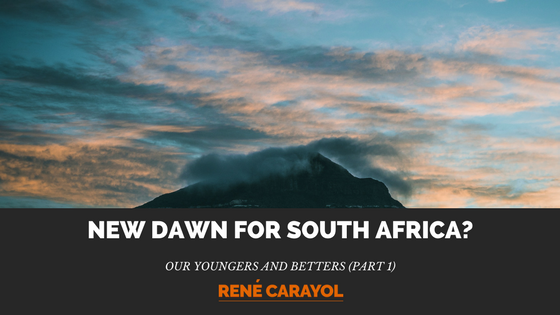New Dawn for South Africa?
It was truly a momentous occasion at the recent ANC’s five yearly congress, it could not have been more tense or intense. Cyril Ramaphosa, the Deputy President narrowly defeated Nkosazana Dlamini-Zuma, President Zuma’s former wife, whom the President had backed. The drama of the day became even more fraught with a last-minute recount eventually confirming the result.
Ramaphosa Won
He won by 2,440 votes to 2,261, prompting relief in many present that soon led to cheering and singing among his supporters at the end of a polarised three-day congress marked by long hours of backroom political infighting.
Could this be the stalled beginning of the much-promised new dawn for South Africa?
My Love Affair with South Africa
From a personal perspective, this is so vital for South Africa, and in fact, for all of Africa. My enduring love affair with the stunning country of South Africa began in 2000. I had been invited to do some leadership work with Barclays Africa, whose head office, at the time, was in Johannesburg.
The Going is Tough
Ramaphosa also faces the huge challenge of bringing South Africa back from the brink of economic crisis. His campaign mantra and promise of a “moral renewal” of the country and the ruling party touched raw nerves but had worked. He was mindful to avoid naming names, but it was clear that he was talking about the “state capture” that has been so condemned under the current leadership.
Promise Pillage Stoppage
Some unscrupulous but well-connected bandits have lined their pockets and some recent estimates have this state looting the equivalent of as much as 5% of gross domestic product (GDP). Most areas of government have been tarnished in this feeding frenzy. Ramaphosa has his work cut out, and expectations are high. He has boldly vowed to stop the pillage.
Largest And Most Developed Economy
These are pivotal moments for this powerhouse nation of Africa. For many years South Africa had boasted the largest and most developed economy on the continent, a few years ago Nigeria ‘rebased’ the calculation of its GDP and swept past South Africa. Recently, Egypt has claimed that they too have surpassed South Africa. Some recent calculations have South Africa back in the gold medal position.
Intense Competitive Rivalry
This intense competitive rivalry can benefit all African nations, especially if it comes with the opening up of inter African trade and a new collaborative culture. Much damage has been wrought by inward looking heads of state, who crave ‘splendid isolation’ whilst they plunder state coffers away from prying eyes and international scrutiny.
Time Up Big Men
With the recent departure of some of Africa’s ‘Big Men’ dictators, Mugabe in Zimbabwe, Dos Santos in Angola and Jammeh in Gambia, Ramaphosa might just have come at a crucial time. There are still far too many long serving Big Men in charge, but they are all now looking over their shoulders.
What next Africa?
We have to be big enough and brave enough to ask ourselves some difficult and searching questions about what happens next and what part we, as Africans, have to perhaps sacrifice or challenge for the greater good of all.
Look Forward Not Back
The old African chestnut of tribalism is still a huge barrier to progress, but this is now being matched by a generational divide that will not go away and is proving to be as nefarious as the institutionalised tribalism that has caused so many wars, coups, deaths and displacement of millions of innocent civilians.
Courageous Leaders Turned Miserable Dictators
These two barriers to change now need a laser focus. But the history of Africa since the glory of the independence years of some 50/60 years ago has suffered from the leaders who were courageous enough to lead the battles for independence, but have proved to be miserable dictators. They have nearly all remained in power for way too long, nonchalantly changing constitutions to shamelessly prolong their stay in office.
Kigame in Rwanda, Museveni in Uganda, the dynastic mess in Togo, with the brutal dictator, Eyadéma, passing the reins to his son and Kabila in the Democratic Republic of Congo, just refusing to hold elections.
New and Fresh Generation of Leaders Required
This generation of freedom fighters need moving on and quickly. They play the tribal card brilliantly when they need to and all have singularly failed to engage their burgeoning younger generations.
We need a new and fresh generation of leaders. The median age of Africa’s population is startling at just 19 years of age. The majority of Africans were born way after the many liberation struggles across the continent. They have a different mind-set and see the world in very different terms to their parents and their leaders.
The Bygone Struggle
The struggle is a bygone era for them, and this sets them at odds with an older generation that still revere and trust the leaders of the liberation wars, at times, unconditionally. So much so, that in South Africa these children of those who fought so hard and sacrificed so much, are now called pejoratively, the “born frees”.
Born Free Thinking
But maybe the whole battle for independence was so that their children could be ‘born free’?
It might be time to better consider the ‘born frees’ as perhaps controversially, the source of leaders for the new Africa.
What next?
If you have an interest in the future of South Africa then you may be interested in our next Inspired Leaders Network event:
South Africa 2020: what does the future hold for Africa’s most advanced nation?
25 April 2018, 6-9pm – London Venue and broadcast live on Facebook

